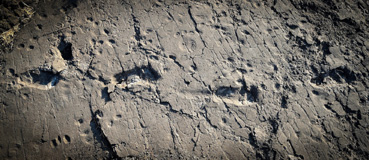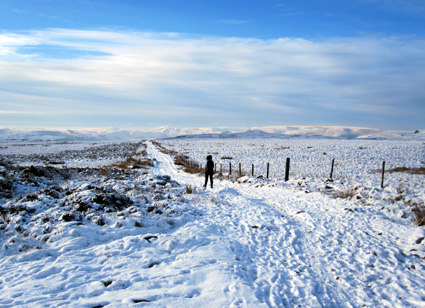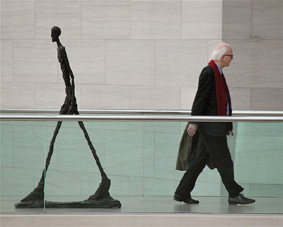Why Walk ?
Clearly walking has been around as long as we have been bipedal. Recently discovered footprints at Laetoli (see photo) have been dated at 3.66 million years. The chair has been around since the first person to sit on a log, but in the last few years the amount of time we spend sitting in one has shot up. Cars, TV, computers have all conspired to cut our activity and sit us down. As a researcher I used walk at least once or twice trips to the library during the week, but as everything came on line actual visits became increasingly rare. I could do it all from a chair.
 |
| Recently discovered footprints dated at 3.66 million years [1]. credits |
So it is only very recently that we have become sedentary and our bodies and minds are not equipped to cope with the inactivity. On the evolutionary timescale it is a step change. As a result inactivity is bad for muscle and bone health - especially as we age.
So how can we counter sitting disease and inactivity? Well, it doesn't have to be marathon training or extreme cardio workouts.
But we do need to get up and move more and even a moderate amount of activity is really beneficial.
Watch this great video by Dr Mike Evans - where he sets the challenge:
can you limit your sitting and sleeping to just 23.5 hours a day?
Actually, there is nothing new here - Hippocrates ( 460 - c. 370 BCE) counselled that
"walking is man's best medicine"
I like to run as well, but in my view running on roads involves a repetitive gait that can't be good for the joints so I prefer to run on trails. And not only for that reason - it's far more enjoyable to run in the country compared to a trot beside a noisy polluted road. Dr Briffa says some sensible things about running and walking that are worth looking into.
Walking and health - Is your chair killing you?
In the modern world we are increasingly susceptible to what Dr Mike Evans calls "Sitting Disease". Listen up! It's use it or lose it! Inactivity is not without consequence, it has a deleterious effect on the body. Muscles (and the heart is a muscle) lose mass and become weaker if they are not used. Your body must expend a lot of energy to maintain your muscles, so if you aren't using a particular muscle group enough, your body quickly gets the message that you don't need it, and the muscle group starts to break down. This break down of muscle tissue is referred to as muscle atrophy. Beyond its effects on the heart, physical activity is important for the extended cardiovascular system too. Without physical activity, your blood vessels become thicker and less flexible, while your blood becomes stickier. This dangerous combination increases your risk for a blood clot, a semi-solid mass of collected blood cells that can block a blood vessel. Blood clots are deadly if they occur in your heart (heart attack) or brain (stroke). Similarly, your bones are constantly being broken down and rebuilt. There is a feedback mechanism in which the bone cells sense the state of strain (extension or compression/length) in the bone matrix around them and either add or remove bone as needed to maintain the strain within normal limits. So the more strain we put on bones the stronger they get and vice versa. If your bones aren't moving around or supporting weight, then they are broken down at faster rate than they are rebuilt. This can results in osteoporosis when the bones become weak, brittle and easy to break. Inactivity also dulls the response of endocrine system increasing the risk of type 2 diabetes. Furthermore, studies have also shown that inactivity adversely affects the nervous system increasing the rate of cognitive decline and risk of dementia.
 |
| Walking. credits |
Although the benefits of walking are remarkable, it is also important to do some weightbearing exercise that stresses the muscles and bone. Otherwise bones can become weak and muscles will lose mass that can be replaced less easily as we age. This might be doing some training in the gym, but it could be Pilates, Yoga or climbing / bouldering for example.
Walking and mental health
For me, I think walking is also important for mental health; particularly walking in the countryside. It's good just to get a break from the city, slow the pace and set eyes on the distant horizon. Walking can be a social activity and, of course, friendships are a key factor in maintaining mental health. But I also enjoy walking alone. Walking alone is better for nature watching, a chattering group just scares it all away. If I am out alone for a long walk my mind goes through various phases thinking about various aspects of my life. Maybe, when I've done with that, the mind quietens down a bit and I can enjoy just "being" with awareness of self and environment. By the time I come back I will be in a different frame of mind having surveyed many aspects of my existence. With the exception of very tough long walks that have challenged my endurance I cannot think of a time when that frame of mind has been worse than the one I started with, even if it has been raining! If something difficult has happened in my life - I walk, sometimes for hours if I can. I'm sure it helps. There is more here.
Walking and Creativity
 |
| Walking Man II, Alberto Giacometti, National Gallery of art, Washington dc. credits |
References
[1] William L Jungers. elife sciences. Paleontology: These feet were made for walking, December 14, 2016.